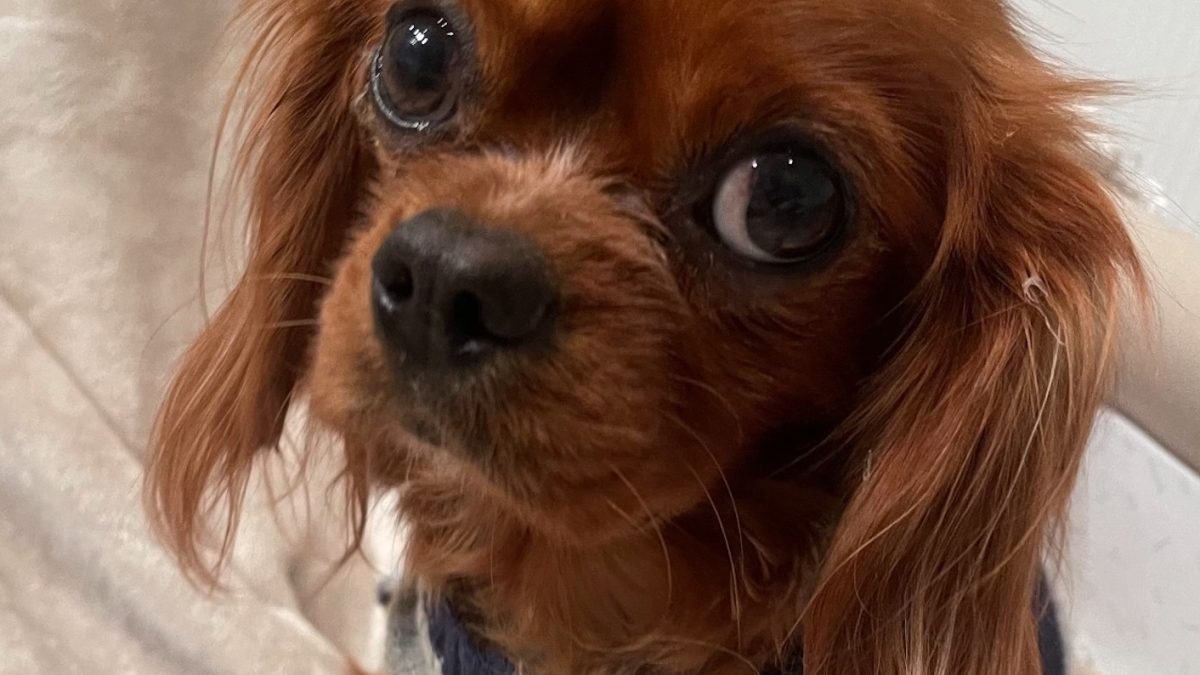Rupert’s recovery since his protein losing enteropathy (PLE) crisis

Adopting a Cavalier around the Christmas period
13 December 2022
Chronic pancreatitis in Cavalier King Charles Spaniels
16 December 2022As many of you will know, Rupert was extremely poorly at the end of October and was admitted to a veterinary hospital with protein losing enteropathy. He was fortunate to have your support and a fantastic internal medicine team working around the clock to save his life.
What is protein losing enteropathy?
Canine protein losing enteropathy (PLE) is a condition in which the dog’s intestines cannot properly absorb protein. This can lead to a loss of protein in the dog’s body, which can cause various symptoms, such as weight loss, diarrhoea, vomiting, and weakness.
What happened to Rupert?
Rupert was found to have extremely low albumin and was critically ill. Albumin is a protein that is produced by the liver and plays a critical role in maintaining the proper balance of fluids in the body. Low levels of albumin can be caused by a variety of underlying conditions, such as liver disease, kidney disease, or protein-losing enteropathy. His blood tests and scans at our general practice vets eliminated liver and kidney disease; therefore, the vets knew it was PLE.
He was admitted to the hospital as an emergency for an urgent albumin plasma transfusion. It wasn’t plain sailing; the internal medicine team really fought for him and needed to offer a lot of supportive care. His body was filling with fluid, and the race was on to increase his albumin level; we knew the fluid would start to drain away when it increased. At one point, Rupert almost died; he had a ‘do not resuscitate’ order implemented which was the right thing at the time, but one of the hardest things we have ever had to do for him. His very experienced specialist and their team managed to turn things around, and just hours later, he was racing around in ICU!
Rupert is a fighter. Everyone that meets him is surprised at what a happy, cheeky little chap he is! For the most part, besides this crisis, Rupert is very well-managed and doesn’t know anything is wrong with him. He is very outgoing, plays and wrestles with his doggy pals, and can also be very naughty!
He wasn’t bred with health in mind; sadly, that is the case for many Cavaliers. We see very severe health conditions in young Cavaliers, more so in the last 2-3 years. Rupert’s previous owner was left heartbroken, in massive debt and without a puppy.
Managing Rupert and being a step ahead is very stressful for the vets that look after his care. Every decision made comes with a potential problem; he is an extremely difficult case for them to manage. Certainly, without the veterinary team he has looking after him, it is very unlikely he would have survived beyond 6 months of age. He is now celebrating his second birthday. There will of course be more road bumps ahead, he isn’t cured, but we have a good treatment plan tailored to his needs to keep him stable.
What causes canine PLE?
PLE can be caused by various underlying conditions, such as inflammatory bowel disease, lymphangiectasia, or neoplasia.
In Rupert’s case, the PLE was caused by inflammatory bowel disease, confirmed by gut biopsy. Rupert had a ‘pinch biopsy’ as soon as he was stable enough to have anaesthesia to confirm his diagnosis; this was imperative to know how to treat him properly and keep him stable to avoid another crisis. Putting Rupert under anaesthesia has been something that we have been trying to avoid for over 18 months, but with much caution, things went smoothly.
He remains on a hydrolysed diet for the rest of his life to manage his condition with the support of medication.
Inflammatory bowel disease
Canine inflammatory bowel disease (IBD) is a condition in which the dog’s intestines become inflamed and swollen. This can lead to a variety of symptoms, such as vomiting, diarrhoea, weight loss, and poor appetite. IBD is a chronic condition, which means that it is long-lasting and may require ongoing management. The exact cause of IBD is not well understood, but it is thought to be related to an abnormal immune response to the bacteria that typically live in the dog’s intestines. Treatment for IBD typically involves medications to reduce inflammation and suppress the immune system and extremely important dietary changes to help manage the symptoms.
Lymphangiectasia
Canine lymphangiectasia is a condition in which the lymphatic vessels in the dog’s intestines become dilated and leaky. This can cause a loss of protein and fluid from the intestines, leading to a variety of symptoms, such as diarrhoea, weight loss, and poor appetite. Lymphangiectasia can be caused by a variety of underlying conditions, such as inflammatory bowel disease, cancer, or parasitic infections. Treatment for lymphangiectasia typically involves addressing the condition’s underlying cause, if one can be identified, and may include medications, dietary changes, and supportive care.
Neoplasia
Neoplasia is the formation of a tumour or abnormal growth in the body. The underlying cause of the PLE may be related to the presence of a tumour in the dog’s intestines. This can lead to a variety of symptoms, such as diarrhoea, weight loss, and poor appetite.
Treatment for PLE involves addressing the condition’s underlying cause and may include medications, dietary changes, and supportive care.




